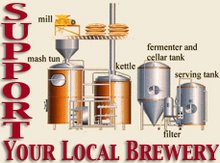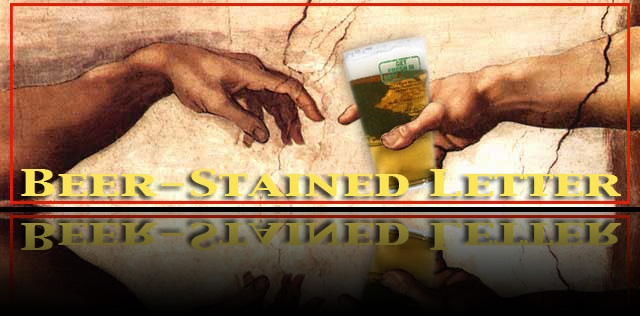Consumer preference ... oh, and maibock
 |
| Tasting room lineup |
It's sort of like art answering life that explains how a brewery known for well-received bocks, märzens and wheat beers would stir a sour ale into the mix.
On the heels on the brewery's annual maibock release, founder Greg Zaccardi talks about such marketplace responses; how his brewery in Butler, on the northern edge of Morris County, has embraced new state rules that finally nurture New Jersey's 18-year-old craft beer industry; and how High Point, as a contract brewer, has given a helpful lift to another emerging brand.
BSL: This is the first big event you've held since regulations that had hemmed in New Jersey craft brewers were lifted last fall. Regulars to your annual maibock release would certainly notice a big difference. For instance, tour guests could buy your beer by the glass, and even before this event, a specific beer release – your maibock release – you had taken advantage of that greater outreach to the public. Can you talk a little about how that has served High Point as a craft brewery?
GZ: Governor Christie finally made it reasonable to run a brewery in New Jersey. Customers want more than just a few-ounce sample in a plastic cup. When I was a homebrewer and would seek out all of these great breweries and go to them, it was disheartening if you got a plastic shot glass. I never liked doing that, (but) that was really all we could do.
Being able to sell beer by the glass is not only good for us, it not only generates a little bit of a revenue stream, it helps us continue along in our journey toward growing our brewery. It also gives the consumer an enjoyable experience.
We still give free samples, and if they like what they're drinking, they can actually get a full glass, hang out – we're here for three hours – they can listen to me explain the art and science of brewing beer. Or they can just hang out with their friends in a brewery environment, listen to the fermenters bubble away, and just experience the vibe of being in a brewery.
We still give free samples, and if they like what they're drinking, they can actually get a full glass, hang out – we're here for three hours – they can listen to me explain the art and science of brewing beer. Or they can just hang out with their friends in a brewery environment, listen to the fermenters bubble away, and just experience the vibe of being in a brewery.
So it's a great thing: It's sustainable for the business end, and I think it's great to be able to offer that experience to people who care about our beer.
 |
| Tour at 2013 maibock release |
GZ: The other thing this new law allows is to host events. And it helps us run our non-tour weekends better. We can afford to do special one-off brewery exclusives, like our Belgian holiday ale, which was very different for us, as somebody said, a bit of a step outside our comfort zone. You need to do that every once in a while, and we're looking forward to doing more stuff like that. If all you do is make one type of beer day after day, it starts to get to a yawn factor.
We've really tried hard to be as efficient as we can with our brewing practices here so they run in a predictable way. That's good, but the flipside of it is you become dangerously complacent, and it can get boring. We have some young brewers (head brewer Alexis Bacon and assistant brewer Thomas Maroulakos) here that enjoy all sorts of wild beers. Both of them went up to Vermont recently, toured some breweries small and large in Vermont. It's great to see their enthusiasm. I know I wouldn't do that anymore. But these are guys who are excited about craft beer, and that comes with the responsibility of being creative. If you don't offer an opportunity to be creative, you're going to wind up with people getting very bored.
Doing these one-offs benefits the brewery, and it certainly benefits the growing demand for the consumer.
BSL: But to be clear, that's not the first time you've done a Belgian style. You've contract-brewed those for other people (including Boaks).
GZ: We did a Chimay clone which we were really proud of ...
BSL: That was Chimay red.
GZ: Chimay red, right, and we even had people who sell Chimay come and tell us that they liked it better than Chimay.
BSL: Freshness factor ...
GZ: Absolutely. Freshness is huge. People tell me how much they love our beers, which is very flattering and I'm very grateful for it. They'll go, "It tastes better than the beer I got from Germany ..." But you know what? If the role were reversed, if we were exporting Ramstein from Butler to Bavaria, I don't think it would hold up as well. I can't expect it to be a fair fight there. Beer is best consumed closest to the brewery, for a lot of reasons. It really does taste great when it's fresh from the tap, especially when it's a seasonal, especially when it's a limited brewery offering. You're just hitting pure gold on those things.
BSL: Speaking of seasonals, let's talk about the maibock. It's a marquee beer for you; it's a big event that you've always built things around, and this is the first time you've done it with that greater flexibility courtesy of the state. How would you say things went?
GZ: We were packed.
BSL: High Point traditionally did monthly tours from March to December. How have you redesigned those open houses?
GZ: We have a new format to our tours. We're only doing four instead of 10; we're opening the brewery to more events throughout the year, not just limiting it to 10. (Maibock day) you saw a wooden barrel tapping of the maibock; you could buy beer by the glass; you could fill growlers; you could buy hot sauce and pickles (by the bottle and jar from vendors); there's an artisanal wood stove pizza-maker outside (independent of the brewery) making pulled pork and Margherita pizza ...
The good thing about the maibock is we made a decent amount of it. It's draft-only; it's wonderful this year and it's still 100-point rated on Ratebeer.
BSL: How far will you have distribution on it, since you now have distribution to parts of South Jersey that you didn't have in the past? Are you able, for instance, to get sixtels to a Canal's or Spirits (Unlimited) stores in those areas?
GZ: At this point, we're just doing full kegs through our southern New Jersey distributor. But we should be able to reach some of the South Jersey communities that really appreciate good craft beer. We're there in bottles now (with Ramstein Classic and Blonde). Geographically, it's going to be in Pennsylvania, up to Reading; that would be the farthest point from the brewery that the beer will be available. It's going to be available essentially in Pennsylvania, New Jersey and New York. But this is the first time ever (Ramstein) maibock will get beyond Princeton.
BSL: What was maibock production like for this year, how is it in relation to your overall brewing?
GZ: Our brewing schedule has gone up by 30 percent this year. We've got another fermenter in here. We're doing four to five brews a week. We're doing exclusively draft of the maibock. There's (only) so much we can do. We've got to start to be able to provide some consistency on our Double Platinum Blonde (weiss beer). That seems to be really taking off for us, with the expanded distribution through Ritchie & Page.
You can see the line (points to a map of New Jersey) ... It used to be right in the middle, by Raritan Bay. Now we're all the way down. It's almost a 50 percent, in geographical increase, in the size of the market.
BSL: Two-thirds of the state covered ...
GZ: Yeah, and before that we were in a little less than half. Fortunately, they're patient with us. We never overpromise them volume. By the same token, I don't want to neglect the rest of my home state. That part of the state is growing with craft beers. There are breweries, and with breweries there, the bars are going to pop up. There are festivals held down there ...
BSL: Taking a glimpse at the state industry overall, for a moment, High Point has been brewing Boaks Beer on contract for five years, and now you've taken on Bolero Snort as contract while owners Bob Olson and Andrew Maiorana plan their brewery. High Point is sort of the beneficent brewery that is enabling other people to get into the business.
GZ: I never thought of myself as an enabler (laughs). With the guys from Bolero, we were impressed with their real focus – dedication – to making their brewery happen. I think we turned them down (initially) because of capacity issues. But there's a new fermenter here for them because of them. That's being filled by their beers, and they're making great beers.
They're great guys to deal with. They've really invested a lot in their operation. We're happy to do it. At the end of the day, the building is here, our overhead exists whether we have the lights off or the lights on. It still costs us the same amount of money every hour.
BSL: But there are some people who might not want to do that, because you could potentially be putting a tap handle out there that competes with you. In another respect, it's the essence of this industry, rising tide lifting boats, being more communal. Plus early on in craft brewing, Bud and Miller did what they could to keep the small guy out of business.
GZ: I've never been afraid of competition. I know that sounds a bit arrogant. But here's an Italian guy in northern New Jersey making southern Germany wheat beers, fighting against breweries like Hacker-Pschorr, Paulaner, Hofbrauhaus, which is funded by the state of Bavaria. Our competition has been steep from Day One.
There will always be competition out there. (With Bolero) it's not like were making them a proprietary recipe from Ramstein. They're seeing some really good success with their black India pale (lager). For us, we have to make the very best beer we can make. The rest of it is up to the consumer. If the consumer wants a Belgian chocolate cherry sour ale, we're going to make it for them. If they want a black India pale lager, which is the Bolero Snort beer, we'll make it for them. So long as it's good.












No comments:
Post a Comment